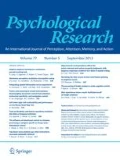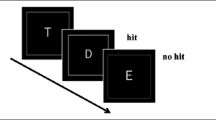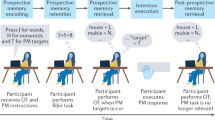Abstract
The current study examined the impact of length and difficulty of the delay task on young adult’s event-based prospective memory (PM). Participants engaged in either a short (2.5 min) or a long (15 min) delay that was filled with either a simple item categorization task or a difficult cognitive task. They also completed a questionnaire on whether they thought about the PM intention during the delay period and how often they thought about it. Results revealed that participants’ PM was better after a difficult delay task compared to an easy delay task. Participants thought about the PM intention more often during the difficult delay task than during the easy delay task. PM performance was positively related to participants’ reports of how many times they thought about their intentions. The important role of delay task difficulty in allowing or preventing individuals from refreshing their future intentions is discussed.

Similar content being viewed by others
References
Balota, D.A., Yap, M.J., Cortese, M.J., Hutchison, K.A., Kessler, B., Loftis, B., Neely, J.H., Nelson, D.L., Simpson, G.B., & Treiman, R. (2007). The English lexicon project. Behavior Research Methods, 39, 445–459.
Brandimonte, M. A., & Passolunghi, M. C. (1994). The effect of cue-familiarity, cue-distinctiveness, and retention interval on prospective remembering. The Quarterly Journal of Experimental Psychology, 47, 565–587.
Brown, J. (1958). Some tests of the decay theory of immediate memory. Quarterly Journal of Experimental Psychology, 10, 12–21.
Cook, C., Ball, B. H., & Brewer, G. A. (2014). No effects of executive control depletion on prospective memory retrieval processes. Consciousness and Cognition, 27, 121–128.
Ebbinghaus, H. (1885). Über das gedächtnis: Untersuchungen zur experimentellen psychologie. Duncker & Humblot.
Ebbinghaus, H. (1964). Memory: A contribution to experimental psychology (H. A. Ruger & C. E. Bussenius, Trans.). New York: Dover. (Original work published 1885).
Einstein, G. O., Holland, L. J., McDaniel, M. A., & Guynn, M. J. (1992). Age-related deficits in prospective memory: The influence of task complexity. Psychology and Aging, 7, 471–478.
Einstein, G. O., & McDaniel, M. A. (1990). Normal aging and prospective memory. Journal of Experimental Psychology: Learning, Memory, and Cognition, 16, 717–726.
Finstad, K., Bink, M., McDaniel, M., & Einstein, G. O. (2006). Breaks and task switches in prospective memory. Applied Cognitive Psychology, 20, 705–712.
Guynn, M. J., McDaniel, M. A., & Einstein, G. O. (1998). Prospective memory: When reminders fail. Memory & Cognition, 26, 287–298.
Hicks, J. L., Marsh, R. L., & Russell, E. J. (2000). The properties of retention intervals and their affect on retaining prospective memories. Journal of Experimental Psychology: Learning, Memory, and Cognition, 26, 1160–1169.
Johansson, O., Andersson, J., & Ronnberg, J. (2000). Do elderly couples have a better prospective memory than other elderly people when they collaborate? Applied Cognitive Psychology, 14, 121–133.
Kvavilashvili, L., & Fisher, L. (2007). Is time-based prospective remembering mediated by self-initiated rehearsals? Role of incidental cues, ongoing activity, age, and motivation. Journal of Experimental Psychology: General, 136, 112–132.
Mahy, C. E. V., & Moses, L. J. (2015). The effect of retention interval task difficulty on children’s prospective memory: Testing the intention monitoring hypothesis. Journal of Cognition and Development, 16, 742–758.
Mahy, C. E. V., Moses, L. J., & Kliegel, M. (2014). The development of prospective memory in children: An executive framework. Developmental Review, 34, 305–326.
Mahy, C. E.V., & Moses, L. J. (2011). Executive functioning and prospective memory in young children. Cognitive Development, 26, 269–281.
Martin, B. A., Brown, N. L., & Hicks, J. L. (2011). Ongoing task delays affect prospective memory more powerfully than filler task delays. Canadian Journal of Experimental Psychology, 65, 48–56.
McBride, D. M., Coane, J. H., Drwal, J., & LaRose, S. A. M. (2013). Differential effects of delay on time-based prospective memory in younger and older adults. Aging, Neuropsychology, and Cognition, 20, 700–721.
Nigro, G., & Cicogna, P. C. (2000). Does delay affect prospective memory performance? European Psychologist, 5, 228–233.
Nigro, G., Senese, V. P., Natullo, O., & Sergi, I. (2002). Preliminary remarks on type of task and delay in children’s prospective memory. Perceptual and Motor Skills, 95, 515–519.
Peirce, J. W. (2007). PsychoPy—psychophysics software in Python. Journal of Neuroscience Methods, 162, 8–13.
Raven, J. C. (1941). Standardization of progressive matricies. British Journal of Medical Psychology, 19, 137–150.
Scullin, M. K., & McDaniel, M. A. (2010). Remembering to execute a goal sleep on it! Psychological Science, 21, 1028–1035.
Sellen, A. J., Louie, G., Harris, J. E., & Wilkins, A. J. (1997). What brings intentions to mind? An in situ study of prospective memory. Memory (Hove, England), 5, 483–507.
Shelton, J. T., Cahill, M. J., Mullet, H. G., Scullin, M. K., Einstein, G. O., & McDaniel, M. A. (2013). Resource depletion does not influence prospective memory in college students. Consciousness and Cognition, 22, 1223–1230.
Shelton, J. T., McDaniel, M. A., Scullin, M. K., Cahill, M. J., Singer, J. S., & Einstein, G. O. (2011). Cognitive exertion and subsequent intention execution in older adults. The Journals of Gerontology Series B: Psychological Sciences and Social Sciences, 66, 43–50.
Somerville, S. C., Wellman, H. M., & Cultice, J. C. (1983). Young children’s deliberate reminding. The Journal of Genetic Psychology, 143, 87–96.
Souza, A. S., Rerko, L., & Oberauer, K. (2014). Unloading and reloading working memory: Attending to one item frees capacity. Journal of Experimental Psychology: Human Perception and Performance, 40, 1237–1256.
Stone, M., Dismukes, K., & Remington, R. (2001). Prospective memory in dynamic environments: Effects of load, delay, and phonological rehearsal. Memory (Hove, England), 9, 165–176.
Szarras, K., & Niedźwieńska, A. (2011). The role of rehearsals in self-generated prospective memory tasks. International Journal of Psychology, 46, 346–353.
Tierney, S.M., Bucks, R.S., Weinborn, M., Hodgson, E., & Woods, S.P. (2016). Retrieval cue and delay interval influence the relationship between prospective memory and activities of daily living in older adults. Journal of Clinical and Experimental Neuropsychology, 38, 572–584.
Acknowledgements
Preparation of the manuscript was partially funded by a Natural Sciences and Engineering Council of Canada Discovery Grant (RGPIN-2015-03774) and Swiss Government Scholarship to CEVM. MK acknowledges funding from the Swiss National Science Foundation (SNSF). The authors wish to thank Chirine Ajram, Joelle Barthassat, Katelyn Brausewetter, Riley Brennan, Malik Djela, Alison O’Connor, and Delphine Paumier for their assistance with data collection.
Author information
Authors and Affiliations
Corresponding author
Ethics declarations
Funding
This study was funded by the Natural Sciences and Engineering Council of Canada (Grant Number: RGPIN-2015-03774 to Caitlin Mahy).
Conflict of interest
Caitlin Mahy, Katharina Schnitzspahn, Alexandra Hering, Jacqueline Pagobo, and Matthias Kliegel declare that they have no conflict of interest.
Ethical approval
All procedures performed in studies involving human participants were in accordance with the ethical standards of the institutional and/or national research committee and with the 1964 Helsinki declaration and its later amendments or comparable ethical standards.
Informed consent
Informed consent was obtained from all individual participants included in the study.
Appendices
Appendix
Participant Questionnaire
Forced choice responses are indicated in bold.
-
1.
Please describe what you had to do in the lexical decision task. If participant did not describe the lexical decision task rules and the rule of pressing the ‘9’ key when they saw an animal word, the experimenter followed-up with probes: (1) What were you supposed to do in the lexical decision task? (2) Was there something else you had to do in the lexical decision task? (3) What were you supposed to do when you saw an animal word? (Administered verbally by the experimenter).
-
2.
Did you think about pressing the button for an animal word during the problem-solving/ item categorization task? YES / NO.
-
If so, how many times?
-
-
3.
Was the intention to press a button when you saw an animal word always present in your mind? YES / NO
-
4.
On a scale of 1 (not at all) to 10 (extremely), how tired are you right now?
-
5.
On a scale of 1 (not at all) to 10 (extremely), how interesting was the problem-solving/ item categorization task?
-
6.
On a scale of 1 (not at all) to 10 (extremely), how interesting did you find the lexical decision task?
-
7.
How old are you?
-
8.
What is your birth date?
-
9.
What is your biological sex? MALE / FEMALE
-
10.
What is your academic major?
-
11.
What is your ethnic background? Please check all that apply.
-
White
-
Black or African American
-
Hispanic, Latino, or Spanish
-
Asian
-
Asian Indian
-
Hawaiian Native
-
Pacific Islander
-
Middle Eastern
-
Alaskan Native or American Indian
Other group (please specify) : __________.
-
Rights and permissions
About this article
Cite this article
Mahy, C.E.V., Schnitzspahn, K., Hering, A. et al. The delay period as an opportunity to think about future intentions: Effects of delay length and delay task difficulty on young adult’s prospective memory performance. Psychological Research 82, 607–616 (2018). https://doi.org/10.1007/s00426-017-0841-2
Received:
Accepted:
Published:
Issue Date:
DOI: https://doi.org/10.1007/s00426-017-0841-2




